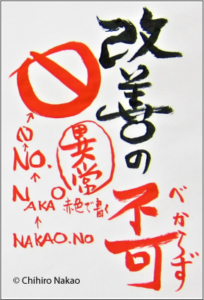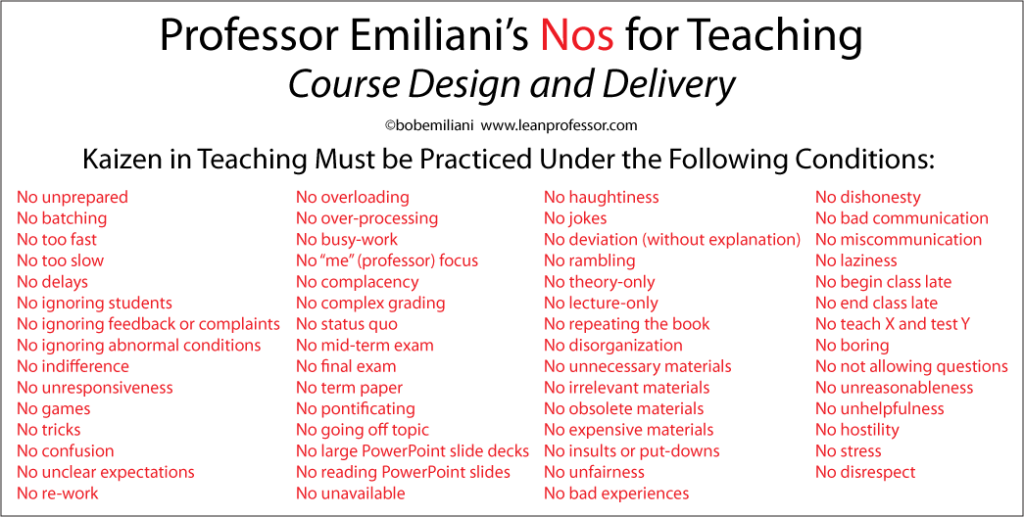Kaizen is practical method for improving any processes, and thus it can also be applied to the design and delivery of courses. In order for kaizen to be effective, kaizen participants must be given strict conditions under which improvements are made. These conditions take the form of “Nos” or “must-nots” – things that people must not do or must not consider as they work to improve a process through trial-and-error.
The purpose of specifying Nos or must-nots is to force people to think of ways to improve without relying on the usual resources such as: more people, more money, more space, more material, more equipment, more software, etc. When people rely on these, the result is the appearance of improvement, not actual improvement.
 The Nos help people do four things:
The Nos help people do four things:
- Abandon preconceptions
- Think differently about the many abnormal conditions contained in the process
- Use creativity and innovation to identify no-cost (or low-cost) ways of making improvements
- Develop one’s capabilities
The Nos that I have identified for my own teaching, both course design and delivery, are inspired by sensei Chihiro Nakao, whose Nos for kaizen in manufacturing are legendary among those who have been fortunate enough to experience kaizen with him as the facilitator (“No AKA“).
My Nos for teaching have been developed over many years of applying kaizen to the design and delivery of my own courses. There are 59 Nos (presently). The result have been outstanding for me as a teacher and, most importantly, for students and for learning outcomes. The same could be true for you as well, regardless of the subject matter that you teach.
Kaizen in teaching – course design and delivery – must be practiced under the following conditions:
No unprepared
No batching
No too fast
No too slow
No delays
No ignoring students
No ignoring feedback or complaints
No ignoring abnormal conditions
No indifference
No unresponsiveness
No games
No tricks
No confusion
No unclear expectations
No re-work
No overloading
No over-processing
No busy-work
No “me” (professor) focus
No complacency
No complex grading
No status quo
No mid-term exam
No final exam
No term paper
No pontificating
No going off topic
No large PowerPoint slide decks
No reading PowerPoint slides
No unavailable
No haughtiness
No jokes
No deviation (without explanation)
No rambling
No theory-only
No lecture-only
No repeating the book
No disorganization
No unnecessary materials
No irrelevant materials
No obsolete materials
No expensive materials
No insults or put-downs
No unfairness
No bad experiences
No dishonesty
No bad communication
No miscommunication
No laziness
No begin class late
No end class late
No teach X and test Y
No boring
No not allowing questions
No unreasonableness
No unhelpfulness
No hostility
No stress
No disrespect

